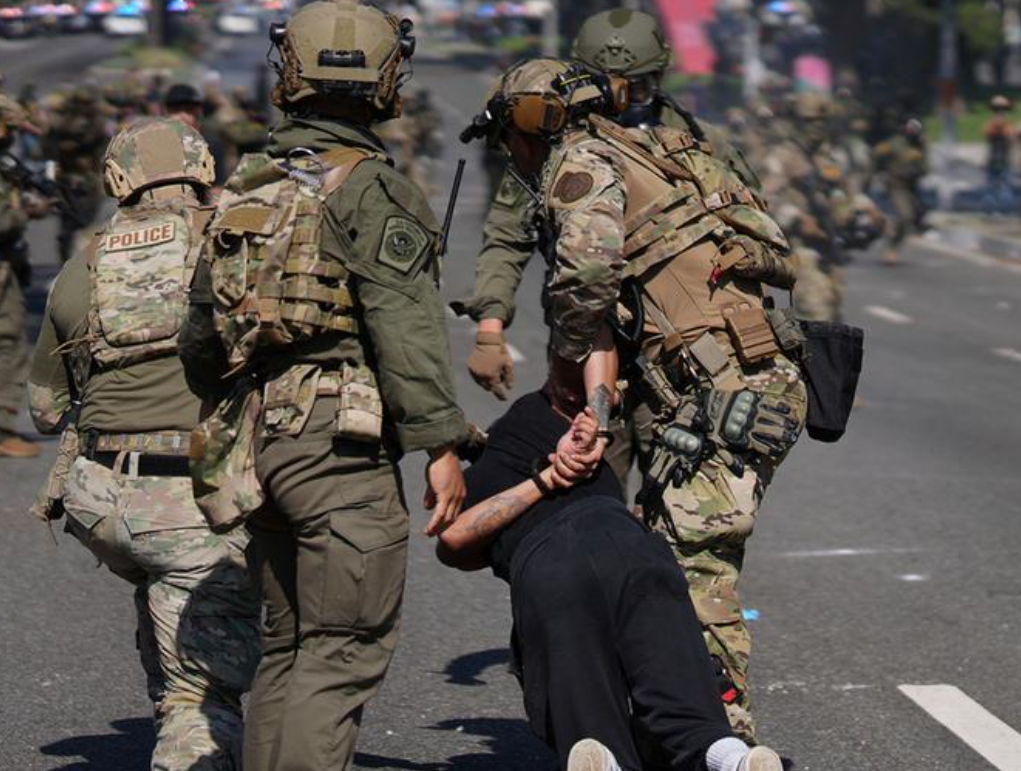LA Protests:Tensions escalate in Los Angeles as President Donald Trump deploys the National Guard to tackle rising unrest and immigration issues. California Governor Gavin Newsom calls the move unlawful and politically motivated, sparking a war of words between state and federal authorities. As protests grow, Trump accuses demonstrators of being paid insurrectionists, while leaders like Mayor Karen Bass and Mexico’s President Claudia Sheinbaum push back against federal actions and defend immigrant communities.
LA Protests
The situation in Los Angeles has taken a dramatic turn after U.S. President Donald Trump ordered the deployment of National Guard troops to the city. Justifying the move, Trump declared that the action was essential to ensure “very strong law and order” amid what he described as chaos, insurrection, and lawlessness in the region.
Critics, however, have blasted the decision, saying the deployment of the National Guard was not only unnecessary but has worsened the situation. According to them, the move has fueled unrest and pushed Los Angeles into a deeper crisis.
Trump, in a public statement, lamented that Los Angeles — once, in his words, a “great American city” — has been “invaded and occupied by illegal aliens and criminals.” As demonstrators clashed with security forces on the streets, Trump doubled down, labeling them “violent insurrectionist groups” who, he claimed, were attacking federal agents.
Trump says:
A once great American City, Los Angeles, has been invaded and occupied by Illegal Aliens and Criminals. Now violent, insurrectionist mobs are swarming and attacking our Federal Agents to try and stop our deportation operations — But these lawless riots only strengthen our resolve. I am directing Secretary of Homeland Security Kristi Noem, Secretary of Defense Pete Hegseth, and Attorney General Pam Bondi, in coordination with all other relevant Departments and Agencies, to take all such action necessary to liberate Los Angeles from the Migrant Invasion, and put an end to these Migrant riots. Order will be restored, the Illegals will be expelled, and Los Angeles will be set free. Thank you for your attention to this matter!
The backlash from California’s leadership was swift. Governor Gavin Newsom accused the President of deliberately escalating the situation. Newsom described the deployment of hundreds of National Guard soldiers as a strategy to “manufacture a crisis.” According to him, “we did not have a problem until Trump got involved.”
The White House defended the move, stating that President Trump invoked Title 10, a seldom-used federal law. This provision permits the federalization of National Guard troops in times of rebellion or when there is a danger of rebellion against the authority of the U.S. government. While legal, the use of this power is considered highly aggressive and has only been invoked a handful of times in modern history.
In a further challenge to federal authority, Governor Newsom took direct aim at Trump’s immigration crackdown. During a television interview, he dared former acting ICE Director Tom Homan to “come and arrest him.” This came in response to Homan’s earlier threats to detain state officials who stood in the way of the federal government’s immigration enforcement. Newsom’s message was clear: California would not bend to what he sees as an unjust, heavy-handed immigration agenda.
Trump also lashed out at Los Angeles Mayor Karen Bass, accusing her of failing the city and calling for both Newsom and Bass to apologize to residents for what he called “an absolutely horrible job.” Bass, in turn, labeled the deployment of federalized troops “a dangerous escalation.” She criticized the administration’s tactics: “When you raid Home Depot and workplaces, when you tear parents and children apart, and when you run armored caravans through our streets, you cause fear and you cause panic.” She insisted the move was not about public safety but about advancing a separate political agenda. “There’s clearly no plan, and there is clearly no policy,” she added, vowing that city leadership stood with “all Angelenos, no matter where you were born.”
In yet another controversial social media post, Trump went further to claim that demonstrators in Los Angeles were not grassroots protesters but “paid insurrectionists.” This accusation only deepened the divide, raising questions about freedom of speech, civil rights, and the labeling of dissenters.
The federal crackdown did not go unnoticed internationally. Mexico’s President, Claudia Sheinbaum, issued a public response in defense of Mexican migrants in the U.S. She emphasized that Mexicans living in the United States are not criminals but “good, honest men and women” who came to the country in search of a better life and to support their families.
As the situation unfolds, Los Angeles stands as a flashpoint in the broader national debate over immigration, federalism, protest rights, and the use of military power within U.S. borders. With neither side showing signs of backing down, the standoff marks yet another defining moment in the deeply polarized political landscape of the United States.
Disclaimer:
This article is based on publicly available news reports, statements, and developments as of the time of writing. It is intended for informational purposes only and does not reflect the personal views or political stance of the author or the platform. Readers are encouraged to verify facts from official sources and consider multiple perspectives before forming an opinion.

